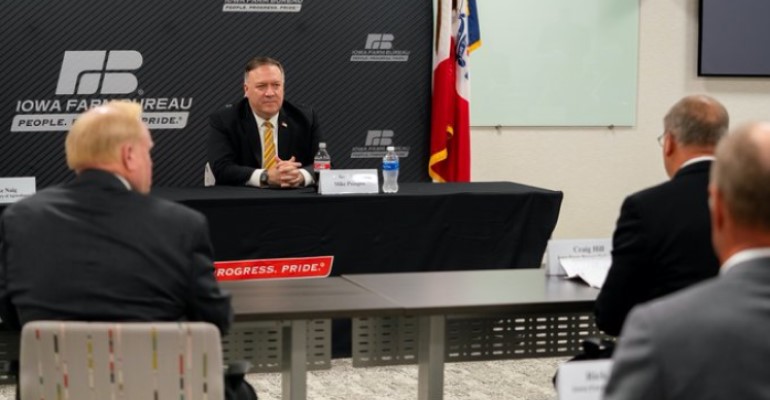Iowa farm leaders highlight importance of trade to economic well-being and accomplishing China trade deal.

U.S. Secretary of State Mike Pompeo held a roundtable with Iowa farm leaders July 17 and discussed the importance of trade as well as provided an update on China.
Iowa Farm Bureau Federation president Craig Hill said he appreciated the opportunity to visit with Pompeo and discuss the essential role trade plays with Iowa agriculture. “The pandemic has only served to intensify the negative impact farmers were feeling prior to COVID-19,†Hill said.
"Leaders from across Iowa agriculture shared the importance of trade with China and were encouraged to hear Secretary Pompeo recognize the importance of the Phase One Trade Agreement and express confidence the agreement will be fulfilled,†Hill added.
In a tweet, Pompeo said, “Our farmers and local leaders are the backbone of this country. Organizations like @IowaFarmBureau ensure that we keep our competitive economic advantage overseas while also benefiting American communities. Together we’ll build a future that is vibrant, strong and prosperous.â€
Always great to be in the Heartland and grateful to have had the opportunity to share with fellow Midwesterners the range of important international issues the @StateDept is working on for the American people. pic.twitter.com/DhodbRPy0K
— Secretary Pompeo (@SecPompeo) July 18, 2020
"Trade is an essential component for Iowa’s agriculture economy, as one out of every three acres of crop production is exported, and one out of every four pigs raised are sent to markets outside our borders," Hill said. "That growth must continue if farming in Iowa is to continue -- a sentiment shared by Secretary Pompeo."
Iowa Soybean Assn. president Tim Bardole and District 5 director Morey Hill also participated in the roundtable discussion.
“The importance of agricultural trade isn’t a talking point for Iowa soybean farmers. It’s reality, and the proof is in the numbers," Bardole said. "As the export of U.S. soybeans and other agricultural products has hit the skids, so, too, have the economic fortunes of farm families and the communities who depend on them to survive and thrive.â€
Earlier this year, U.S.-China Phase One Trade & Economic Agreement was announced. In the deal, China pledged to purchase $36.5 billion worth of American agriculture products in 2020 and $43.5 billion in 2021. This was up from $24 billion in 2017 before the trade deal. However, according to Iowa State University economist Dermot Hayes, China needs to import an additional 18.5 million metric tons (570 million bu.) of U.S. soybeans as well as other agricultural products from now until the end of the calendar year to meet this 2020 target.
In addition to ramping up purchases of U.S. soybeans and other agricultural products, the Phase One agreement outlines a more predictable, efficient, science- and risk-based regulatory process for agricultural biotechnology products, improvements to sanitary and phytosanitary measures and intellectual property protection for agriculture.
“The implementation of this important trade agreement must remain a top priority if we are to improve the economic conditions currently impacting U.S. farmers. In the meantime, we’ll continue to build market relations and sales with additional countries who value the quality and reliability of U.S. soybeans,†Bardole said.
The soybean representatives also urged the Administration to renew its support of renewable fuels and monitor currency depreciation and manipulation taking place in key soybean-producing countries that place U.S. agricultural products at a price disadvantage in the global marketplace.
About the Author(s)
You May Also Like




.png?width=300&auto=webp&quality=80&disable=upscale)
